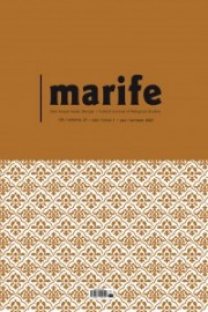Medeniyet Tasavvurunun Unsurları ve Dinamikleri (Kur’ân Verileri Işığında Bir İnceleme)
Toplumların ihtiyaçlarını karşılayabilecekleri mekanlar genelde şehir/medine olarak tanımlanır. Bu ihtiyaçların karşılanabilmesi tabii olarak karşılıklı hak ve sorumlulukları beraberinde getirmektedir. Bu yüzden medine, şehir, yerleşim birimi, toplum ve siyasî otorite gibi unsurlar bir bütün olarak düşünülmelidir. Medeniyet kavramı da son tahlilde bu üç unsurdan müteşekkil olup ve bir değerler manzumesidir. Değerler ise bir medeniyetin muhayyilesini, tasavvurunu oluşturan onun dışa bakan yüzüdür. Bu bağlamda Kur’ân verileri ışığında bir medeniyet tasavvuru da elbette düşünülebilir. Kur’an yerleşim birimi/medine, toplum ve siyasî otorite gibi üç unsura kendi renk ve değerlerini katarak onları yine üç temel dinamik üzere inşa etmek gerektiğine işaret eder. Bu dinamikler kitap, mizan, demir ve onların her birinin sembolize ettiği değerlerdir. Bu açıdan Hadid, 57/25. ayette zikredilen bu üç dinamiğin hem insanlık için anlam ve değer ifade etmesi hem de yenilenebilir, güncellenebilir birer unsur olmaları onları “dinamik” olarak tanımlamamızın gerekçesidir. Bu çalışmada müfessirlerin yoğun bir şekilde ilgilendikleri bu üç dinamiğin geçmişten bugüne neleri karşıladığı, nasıl güncellenebileceği, evrensel bir medeniyet tasavvurunun nasıl oluşturulabileceğinin cevapları aranmıştır.
Anahtar Kelimeler:
Medeniyet, Medine, Kur’an, Medeniyet Tasavvuru
The Factors and Dynamics of Imanigation of Civilization (A Work in the Light of the Data of Qur'an)
The places where societies can meet the need sare generally defined as City / Medina. The fact that the needs can be met naturally brings with, mutual rights and responsibilities. Therefore, the elements such as the medina / city settlement, the society and the political authority must be considered as a whole. The concept of Civilization, which is composed of the three elements in the final analysis are a range of values. The values are imagination of that civilization and outward facing of it. In this context, in the light of the data of Qur’an a imagination of a civilization can be considered. The Qur’an implies necessity of constructs them in three basic Dynamics by adding their own colors and values to the three elements of settlement unit / medina, society, political authority. These Dynamics are the book, the balance, their on and the values the teach of them symbolizes. It is one of the most important styles of the Qur’an to emphasize the main and basic elements while not creating a vision / imagination. In this respect, Hadid, 57/25. The set three dynamics mentioned in the above are values for humanity as well as being renewable and updatable elements, which is why we define them as “dynamic”. In this work, answers will be sought about how these three dynamics, to which the commentators/mufessir are from what they have received in the past to what can be updated, how they can be updated, and what a “universalcivilization idea” is compatible with the Qur’an.
Keywords:
Qur’an, Civilization, City/Madina, The Concept of Civilization,
- Yayın Aralığı: Yılda 2 Sayı
- Başlangıç: 31.05.2001
- Yayıncı: Yediveren Kitap
Sayıdaki Diğer Makaleler
İslam Hukukunda Belge Tanziminde Kimlik Tespit Aracı Olarak Hilye: Dış Görünüş Tasvirleri
Ayetler Bağlamında Âlemin Yaratılışındaki Denge
Ali Kutty MUSLİYAR, Muhammed ÇUÇAK, Arif ATALAY
Buhârî’nin Kitâbü’l-Îmân’ı Üzerine Hanefî Bakış Açısı -Bedrüddîn el-Aynî Örneği-
İslam Kozmoloji Öğretisinde Allah - Tabiat ve İnsan İlişkisi Bağlamında Doğa ve Doğanın Korunması
Yahudi İbadetleri Namaz: Çeşitleri, Vakitleri, Duaları ve Kılınış Şekilleri
Sabâh Nâci EŞ-ŞEYHALÎ, Mustafa ÖLMEZ
Müslim’in Ehl-i Bid’at Râvilerden Rivayet İle İlgili Durumu
Medeniyet Tasavvurunun Unsurları ve Dinamikleri (Kur’ân Verileri Işığında Bir İnceleme)
